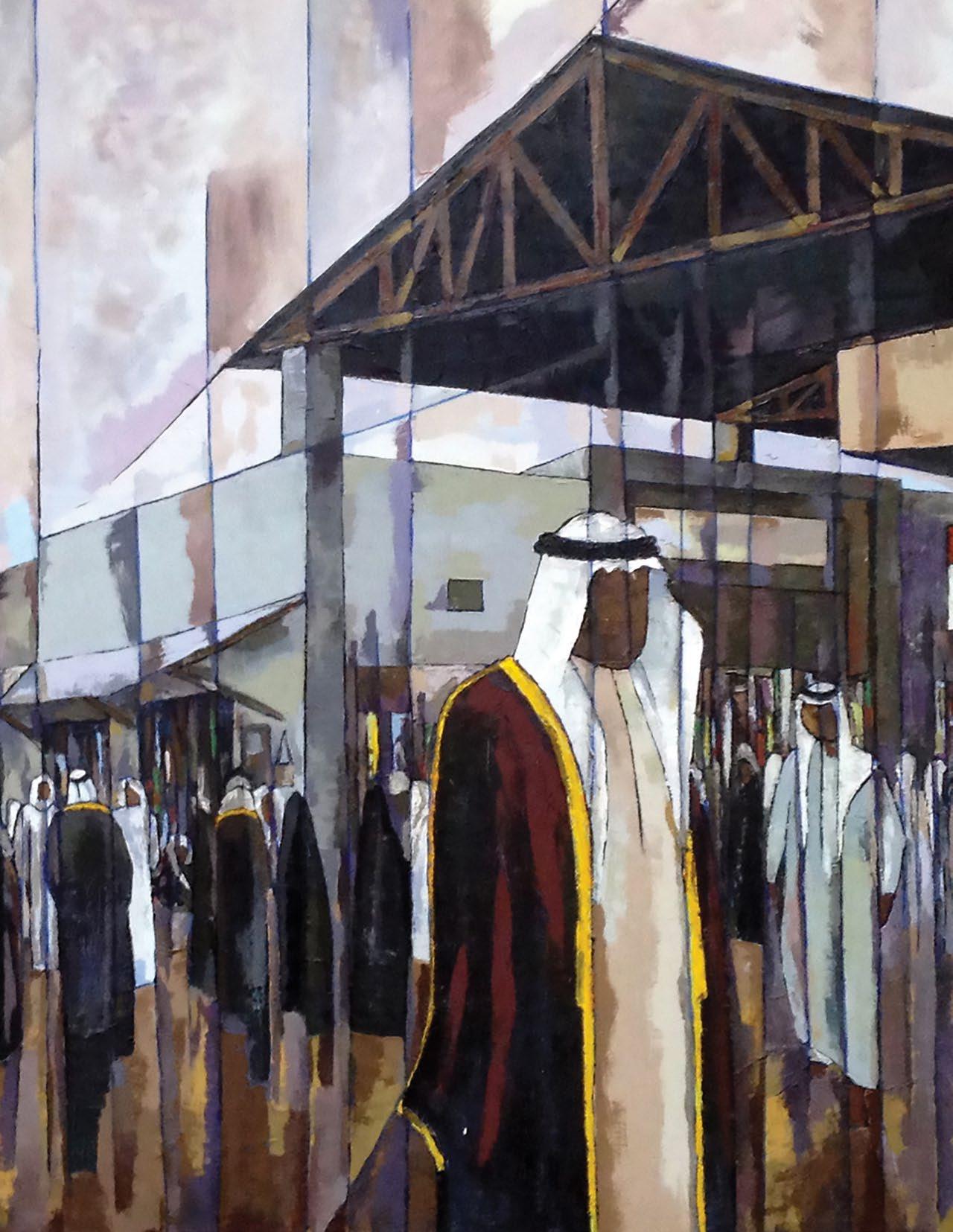
East Initiative
Kennedy School
Middle
Harvard
2021-2022
A little over a decade ago, millions of Arab citizens took to the streets to demand change. Crying “bread, freedom, social justice” and “the people want the fall of the regime,” protesters in Tunisia, Egypt, Libya, and Yemen compelled the removal of long-ruling autocrats and inaugurated a period of participatory, democratic politics in which citizens were able to choose those who would rule them and have some say about how they would rule. But, as readers are no doubt aware, these moments of freedom were not to last. Democracy never got off the ground in Libya or Yemen, which both devolved quickly into civil war. In Egypt, the democratic experiment inaugurated after 18 days of protest was snuffed out after about 18 months, as first religious conservatives, and then the country’s military, muscled aside those who called for freedom. Tunisia’s democratic venture was the longest lasting, limping along for a decade, but it too was ultimately crushed under the weight of chronic political instability, economic crisis, and a global pandemic. Today, we are told, the Arab world finds itself back at square one, the only region of the world entirely bereft of liberal, democratic government.
Like all simple stories, this one gets a lot right, but it ultimately obscures almost as much as it illuminates. The citizens who took to the streets ten years ago called for many things: some wanted the fall of regimes, others wanted an end to the impunity and brutality of security services, but still others called primarily for economic opportunity and a decent standard of living. Some regimes collapsed in the face of these demands; others—like Bashar al-Assad’s Syria and Mu’ammar Qadhafi’s Libya—waged inhuman wars against their citizens; but still others introduced reforms that many believe bear genuine potential to set their countries on evolutionary trajectories. And though the major democracy indices all show the Arab world to be about as authoritarian today as it was on the eve of the Arab Spring, this gives short shrift to the profound ways that the region has changed, and changed indelibly, in response to that display of the Arab people’s ability to imagine, and mobilize on behalf of, a better future.
The activities of the Middle East Initiative during this 10th anniversary year of the Arab Spring might be understood as an attempt to chronicle how the region has changed, and to understand how its people and some of its most public-minded leaders are seeking to respond to popular yearnings and transform their societies for the better. Our programming serves as a powerful reminder that Arab history marches on, that the region’s multitudes of talented and publicspirited people—at least a few of whom are trained by the Kennedy School—continue to work to move their countries forward.
This year, Kennedy School students got an up-close look at this process through a new January-term course, offered with Senior Fellow Sultan Sooud Al Qassemi (p. 14), which took them to the United Arab Emirates to explore the economic, social, and cultural policies that have made that country one of the most dynamic and influential in the region. Many of our students came away from that encounter with a new sense of what the Arab world is and what it can be. Those who had previously seen the region primarily as a domain of violent conflict, stultifying religious conservativism, and endemic poverty left the course with a profound appreciation for the region’s diversity and the existence in it of pockets of prosperity and innovation. They left, too, with searching questions about the extent to which the things they observed could be replicated, not just in other Arab countries, but in the developing world more broadly.
Another opportunity to engage with the changes underway in the region was provided by Middle East Initiative Senior Fellow Omar Razzaz, who served as prime minister of the Hashemite Kingdom of Jordan from 2018 to 2020, after stints as education minister and director of Jordan’s social security administration. A Harvard-trained economist and the scion of a family long steeped in the project of Arab reform, Dr. Razzaz offered to our students an innovative study group (p. 13) that brought them face to face with the hard challenges of balancing long-term goals (such as increasing public sector accountability and taming spending on entitlements) with short-term political considerations (such as getting re-elected and keeping stakeholders happy). These challenges are not unique to the Arab world, of course, and one of the great benefits of this study group is how it puts the region in a broader, global context, and provides our students with Arab examples of reform to go alongside the many from other countries to which they are exposed during their time here.
Our speaker series offered further opportunities for our community to center the Arab world in their intellectual journeys and to grapple with the developments underway there (p. 8). From former US diplomat David Rundell’s discussion of Saudi crown prince Mohammed bin Salman’s sweeping economic and social reforms, to MIT professor Mai Hassan’s discussion of the ongoing struggle for democratic government in Sudan, to Palestinian stateswoman Hanan Ashrawi’s searching reflection of the failures of the Oslo process and the Palestinian people’s struggle for self-determination, to the discussion of the cracks in Egypt’s military-dominated political economy offered by scholars Nathan Brown and Amr Adly, to legal expert Zaid Al-Ali’s discussion of the region’s continuing movements for constitutionalism,
in and will continue to shape it for decades to come. In his capacity as the Director of the Belfer Center, Secretary Carter’s support for the work and purpose of the Middle East Initiative continues to inspire us to reach higher in all that we strive to accomplish.
As our faculty chair, Tarek Masoud, wrote in his October 25, 2022 letter to the MEI community, “I primarily knew Secretary Carter as a senior colleague who drew me into the Belfer Center community, helped provide me with critical resources at a critical phase in
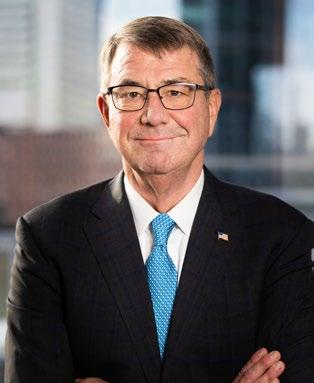
Greetings ابحرم םולש ملاس ⴰⵣⵓⵍ Merhaba,
The passing of Ash Carter at the age of 68, while this issue of the Mosaic was in production, came as a sudden and deep blow to the Harvard, Belfer Center, and Middle East Initiative communities. Secretary Carter was a scholar-statesman of the highest order whose contributions to the thought and practice of American grand strategy have shaped the world we live
Remembering Ashton B. Carter (1954–2022)
our community was treated to a picture of the Middle East not as a region hibernating in some “Arab Winter,” but rather as one fully engaged in an admittedly long, but ultimately inevitable, process of change.
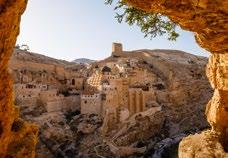
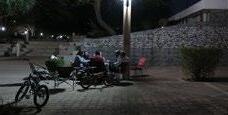

We believe that scholarship has much to contribute to that process of change, and this year we celebrate 20 years of Harvard’s Kuwait Program (p. 4), which has long supported vital research by Kuwaiti and Harvard-based faculty on public problems in Kuwait, the Gulf region, and the broader Arab world. The program—which is made possible by one of the Arab world’s premier scientific and knowledge building institutions, the Kuwait Foundation for the Advancement of Sciences— last year enabled us to host Dr. Eisa Al Nashmi (p. 5, 20), associate professor in the department of journalism at Kuwait University, who completed a project on crisis communications during the recent coronavirus pandemic. It also recently enabled innovative research by Harvard Graduate School of Design Professor Gareth Doherty into how cities in Kuwait and elsewhere in the Gulf are coping with climate change by shifting to increasingly nocturnal patterns of activity (p. 18). That work has extraordinary potential to help us identify and manage some of the negative externalities associated with informal responses to global environmental challenges.
By now it should be clear that I write with a genuine sense of optimism about the future of the Middle East, despite the setbacks and detours of the ten years since the Arab Spring. If you don’t yet fully share that optimism, I encourage you flip to the biographies of our fellows (p. 20) and our students (p. 26), whose presence among us is made possible by the Emirates Leadership Initiative. It’s impossible to read about these extraordinary people and the good work they are doing and not feel that the region’s future is in good hands. They are why I believe that the version of this essay that I write ten years hence will be even more optimistic than this one.
Middle East Initiative MOSAIC 2021-2022
MEI TEAM
Tarek Masoud, Faculty Chair


Julia Martin, Associate Director
Sam Himmelman, Program and Communications Coordinator
Christian Allard, Research Assistant
Ryan Zoellner, Research Assistant

DESIGN

Vinci Design
PHOTOGRAPHY
Bennett Craig
Chris Mawhorter
Sama Kubba
Sahar Albazar
4-7 Kuwait Program Celebrates 20 Years

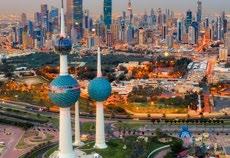
8-9 Event Highlights
Faculty Chair, Middle East Initiative
my career, and who was always ready with a word of encouragement, a smile, and a pat on the back. He was a gentleman of the old school, with all that the term implies of generosity, collegiality, and general benevolence. I speak on behalf of all the members of the Middle East Initiative community when I say that I am fortunate to have known him. May our ongoing work be a testament to his commitment to bridging the worlds of scholarship and action.”
As we mourn the loss of this towering figure, we remain grateful for his dedication to his colleagues, to his country, and to a safe and prosperous future for all. The numerous testimonies of friends and
ON THE COVER:
Ibrahim Ismail (b.1945,

20-21 Research Fellows

colleagues have shown that, whether considering the trajectory of a single acquaintance or of an entire globe, Secretary Carter applied his full attention toward imagining a path to a greater future. We encourage all to re-engage with his important scholarly contributions to American national security strategy, and to reflect on his extraordinary contributions to the country and the institution we all love.
With no better words to conclude than those Professor Masoud shares in his letter, “As we say in the Muslim tradition of which I am a part, ‘To God we belong and to Him is our return.’”
Tarek Masoud
Middle East Initiative Harvard Kennedy School
Kuwait). The Souq, 1995, oil on canvas, 100 x 200 cm. Image courtesy of Barjeel Art Foundation, Sharjah
10-13 Learning From Leaders
14-15 New Field-based Course on Development in the Gulf
16-19 Faculty Research
22-25 Policy Research
26-27 Student Research CONTENTS
KUWAIT PROGRAM AT HARVARD UNIVERSITY KUWAIT PROGRAM BY THE NUMBERS
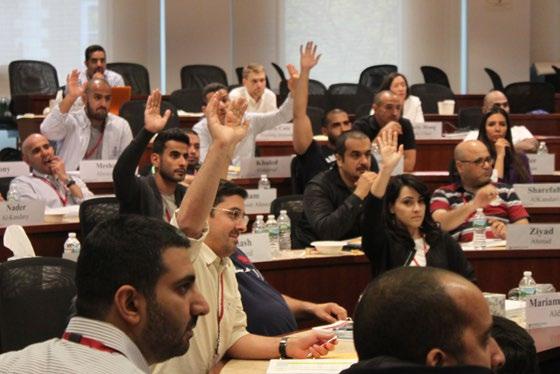
20 YEARS STRONG
55 Harvard Faculty Research Projects
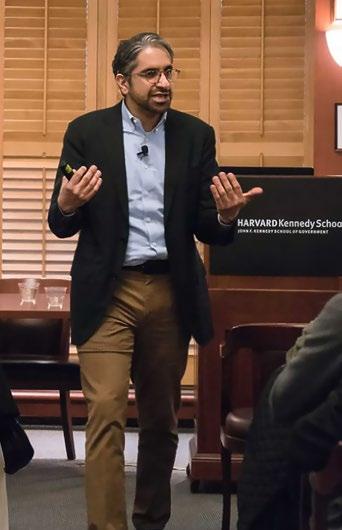
16 Kuwait Program Senior Fellows and Research Fellows
9 HKS Master’s Degree Fellowships
233 Executive Education Fellowships
21 Kuwait/GCC Executive Training Programs
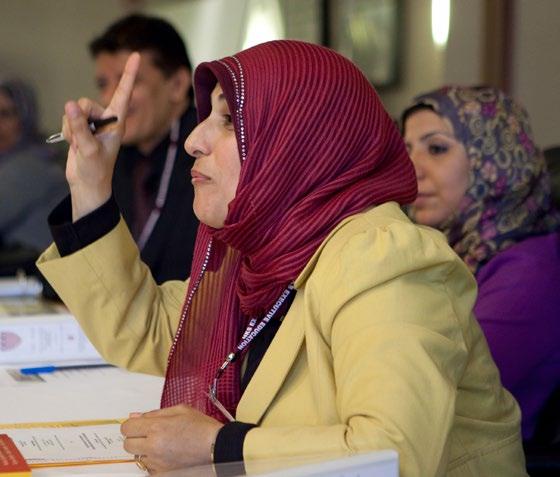

Serving 641 Participants
Celebrating 20 Years
The Kuwait Program at Harvard University, housed at Harvard Kennedy School’s Middle East Initiative, is an important bridge between Harvard, Kuwait, and the Arab world. This year, we celebrate the 20th anniversary of the Kuwait Program, which builds leadership capacity in Kuwait, bolsters research on Kuwait and the Arab world, supports policy-relevant research, and creates important connections between scholars at Harvard and in Kuwait. The Kuwait Program is made possible by a generous gift from the Kuwait Foundation for the Advancement of Sciences (KFAS).
MOSAIC 2021-2022 4
KUWAIT PROGRAM FACULTY RESEARCH GRANTS
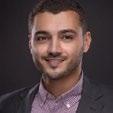
To date, the Kuwait Program has supported 55 Harvard faculty research projects, covering topics that aim to help develop effective public policy in the Middle East and North Africa (MENA). Faculty research projects address regional issues, such as economic impacts of COVID-19, renewable energy and climate change, water security, immigration, education policy, cybersecurity, environmental health, education reform, innovation, and more. Faculty are encouraged to collaborate with Kuwait-based scholars on these projects, strengthening engagement between Harvard and Kuwait research communities.
These grants have supported the work of scholars like Frank Hu, MD, PhD, of the Harvard T.H. Chan School of Public Health and Dr. Hala Alessa, Postdoctoral Research Fellow, who conducted a study on the prevalence of obesity and type 2 diabetes in Kuwait and their relation to sugary drink consumption, and enabled Harvard Professor Venkatesh Narayanamurti, Professor Laura Diaz Anadon, Dr. Afreen Siddiqi and Rebecca Stern to conduct a workshop in Kuwait exploring current challenges in conducting high quality research in local science and engineering institutions, discussing strategies for creating university-industry linkages, and identifying opportunities for regional cooperation. This year, the Kuwait Program grants supported the Kennedy School’s Dr. Soroush Saghafian’s research on “Improving Population Health in the Middle East via Machine Learning and AI-Enabled Mobile Health Interventions,” which aims to help GCC countries better utilize advancements in technologies to improve citizens’ health.
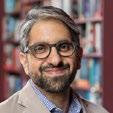
KUWAIT PROGRAM SENIOR FELLOWS AND RESEARCH FELLOWS
The Kuwait Program has hosted 16 Kuwait Program Senior Fellows and Research Fellows at Harvard Kennedy School. These scholars and practitioners bring expertise from government, academia, and civil society to engage with students, faculty, and other fellows at HKS.
In fall 2021, MEI welcomed Sultan Sooud Al Qassemi, founder of the Barjeel Art Foundation in the United Arab Emirates, as a Kuwait Program Senior Fellow. Al Qassemi led a study group on the “Politics of Modern Middle Eastern Art” that studied the intersection of art, politics, and policy in the contemporary Arab world.
Dr. Eisa Al Nashmi, Associate Professor in the Department of Journalism at Kuwait University, was in residence in spring 2022 as the Kuwait Program Research Fellow. While at the Middle East Initiative, Dr. Al Nashmi conducted research pertaining to the effectiveness of crisis communication strategies utilized by the Kuwaiti government during the COVID-19 pandemic, along with an analysis of the post-crisis policy transitions regarding such communication strategies.
REMEMBERING THE LIFE OF MICHAEL HUDSON, KUWAIT VISITING SCHOLAR 2015
The Middle East Initiative celebrates and remembers the life of Michael C. Hudson, PhD. A preeminent scholar of the Middle East, teacher, and friend, Dr. Hudson joined MEI in 2015 as a Kuwait Visiting Scholar. Dr. Hudson’s study group on legitimacy and Arab politics was a highlight for MEI, and his lifetime of scholarship and teaching continues to enrich the lives of the Middle East community at Harvard and beyond. Dr. Hudson received his PhD in comparative politics from Yale University and was the recipient of numerous awards, including the Guggenheim, Ford, and Fulbright fellowships. He served as president of the Middle East Studies Association (MESA), and at Georgetown Dr. Hudson was the Seif Ghobash Professor of International Relations and Arab Studies, Emeritus, and he directed the Walsh School of Foreign Service Center for Contemporary Arab Studies. In addition to his paramount contributions to the field, we will forever remember Dr. Hudson for his genuine kindness, dedication to his students and colleagues, and good humor.

belfercenter.org/MEI 5
KUWAIT PROGRAM EXECUTIVE EDUCATION
The Kuwait Program supports the design and execution of custom executive education programs at Harvard Kennedy School, as well as fellowships for people from Kuwait and the wider Arab world to participate in executive education programs across Harvard University. Since its inception, the Kuwait Program has supported almost 900 participants attending programs on leadership; negotiation and decision-making; science, technology, and innovation; management; investment and finance; education reform; and national security.

In May 2022, 41 Kuwaiti nationals came to HKS for a week-long customized program, Navigating Change: Decision-Making, Negotiation, and Leadership Strategies, designed and led by Professor Kessely Hong, Lecturer in Public Policy at HKS. The interactive curriculum explored new methods of working across traditional sectors and organizational divisions to identify, understand, and address emerging business and public problems. It focused on equipping managers with the tools needed to succeed in the face of new challenges and opportunities, and how to negotiate optimal outcomes in myriad circumstances.
KUWAIT PROGRAM GRADUATE FELLOWSHIP

In 2013, the Kuwait Program launched the Kuwait Foundation Fellowship for Outstanding Emerging Leaders, which provides full scholarships for degree candidates from Kuwait and the Arab world to attend HKS. To date, nine fellowships have been awarded to emerging leaders who have earned a Master of Public Administration or a Master of Public Administration in International Development.

MOSAIC 2021-2022 6
“The Harvard Kennedy School and the Kuwait Foundation for the Advancement of Sciences share a vision of a prosperous and innovative Arab region in which the talents of the youth are unleashed, useful knowledge is generated and disseminated, and public policies are based on the rigorous application of scientific methods. The Kuwait Program at Harvard University has been among our most valued collaborations, and in some ways it is just getting started. We proudly celebrate 20 years of this important endeavor, and we look forward to its continued growth and evolution. I am confident that the coming years will see HKS and KFAS together contribute profoundly to meeting Kuwait’s, the region’s, and the world’s most pressing public challenges.”

“The Kuwait Program at Harvard provided me with an unparalleled opportunity to conduct research with leading faculty on much needed public health policy initiatives in Kuwait. The incredible mentorship, access to Harvard’s scholarly resources, and the connections I made were pivotal in my career. I am deeply grateful for the support of the Kuwait Program and the work it allowed me and my research partners to do to better the livelihoods of my fellow Kuwaitis at home.”
“For two decades, the generosity and commitment of the Kuwait Foundation for the Advancement of Sciences has strengthened the bridge between Harvard and Kuwait and the broader Arab world. The research, educational opportunities, and intellectual exchanges made possible by the Kuwait Program at Harvard continue to be indispensable for advancing policy in the region.”
– Tarek Masoud, Faculty Chair, Middle East Initiative
– Douglas W. Elmendorf, Dean, Harvard Kennedy School
belfercenter.org/MEI 7
- Hala Alessa, Postdoctoral Research Fellow, Harvard T.H. Chan School of Public Health, and co-P.I. on a research project supported by the Kuwait Program that focused on consumption-limiting public policies for sugar to reduce the prevalence of diabetes in Kuwait
EVENT HIGHLIGHTS
UNRWA, Its Mandate, Successes, and Challenges

Philippe Lazzarini, Commissioner-General of the United Nations Relief and Works Agency for Palestine Refugees in the Near East (UNRWA)
Can the Future of Jihadism be Predicted?
Thomas Hegghammer, Senior Research Fellow at the Norwegian Defence Research Establishment in Oslo
The Future of Palestine
Dr. Hanan Ashrawi, a distinguished Palestinian leader, legislator, activist, and scholar who served on the Executive Committee of the PLO and as an official spokesperson of the Palestinian delegation to the Middle East peace process.
James Snyder in Conversation: Israel and the Middle East through a Literary Lens
David Grossman, author
James Snyder, MEI Senior Fellow
From the Iranian Revolution to the Kabul Withdrawal
Kim Ghattas, author and journalist
James Snyder in Conversation: Setting the Stage for Emerging Contemporary Art in Palestine
Aline Khoury, Managing Director of Dar Yusuf Nasri Jacir for Art and Research in Bethlehem
James Snyder, MEI Senior Fellow
MOSAIC 2021-2022 8
This year, MEI engaged with the Kennedy School community through 13 events. Due to the ongoing COVID-19 pandemic, these discussions took place over Zoom. While the on-campus presence of students was deeply missed, moving online afforded a unique opportunity to engage an even wider array of speakers and audiences, and to catalogue these events on YouTube.

Afghanistan and Its Consequences
Ryan Crocker, former U.S. Ambassador to Afghanistan, Iraq, Pakistan, Syria, Kuwait, and Lebanon
Nonstate Warfare: The Military Methods of Guerillas, Warlords, and Militias
Stephen Biddle, Professor of International and Public Affairs at Columbia University
Vision or Mirage: Saudi Arabia at the Crossroads
David Rundell, former US diplomat
Networked Refugees: Palestinian Reciprocity and Remittances in the Digital Age
Nadya Hajj, Whitehead Associate Professor of Critical Thought and Co-Director of the Peace and Justice Studies Program at Wellesley College

Egypt: Lumbering State, Restless Society
Amr Adly, Assistant Professor of Political Science at The American University in Cairo
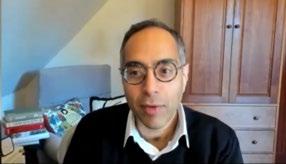
Nathan Brown, Professor of Political Science and International Affairs, George Washington University
Sudan’s Road to Democracy
Mai Hassan, Associate Professor of Political Science, MIT
Arab Constitutionalism: The Coming Revolution
Zaid Al-Ali, author and lawyer
The Security Landscape of the Middle East: The View from Israel
Amos Yadlin, MEI Senior Fellow and former IDF commander
Teetering on the Brink: Turkey’s Troubled Ties with the West
Dr. Nathalie Tocci, Pierre Keller Visiting Professor at Harvard Kennedy School
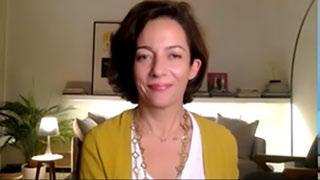
belfercenter.org/MEI 9

10
Ibrahim Ismail (b.1945, Kuwait). Building of Ships, 1966, oil on canvas board, 30 x 40 cm. Image courtesy of Barjeel Art Foundation, Sharjah.
Learning From Leaders:

Middle East Initiative Study Groups
Each year, MEI brings to HKS leading practitioners to actively engage with our students, faculty, and other fellows, as well as to conduct their own research with Harvard’s unparalleled intellectual resources at their disposal. Among the most popular co-curricular activities for students are Senior Fellow-led study groups: discussion-based seminars ranging in length that focus on specialty topics, led by the world’s leading experts in those areas. Study groups help bridge what students learn in the classroom with how policy is implemented in the public sphere. On the following pages are highlights of MEI’s 2021-2022 study groups.

CULTURE, ART, AND POLITICS
Sultan Sooud Al Qassemi is an Emirati columnist and researcher who specializes in social, political, and cultural affairs in the Arab Gulf. He is also the founder of the Barjeel Art Foundation in Sharjah, UAE. In fall 2021, Sultan led a study group on “Investigating the Politics of Modern Middle Eastern Art.”
The study group examined Middle Eastern politics through the study of the region’s art production. “Many students approach the region of West Asia and North Africa through an exclusively political context,” Al Qassemi said. “It is essential to consider the cultural dynamics that influence political and social spheres across the region, such as the formation of national identities and championing of pan-Arab causes.”



Al Qassemi’s syllabus guided students in exploring the relationship between the evolving political landscape and contemporary Arab art. Each discussion focused on a specific art piece in its political context, which helped students better understand that political context and the artwork itself.
CONFLICT RESOLUTION
Rami Khouri led an eight-part study group titled, “I See You. I Hear You. I Recognize Your Pains and Your Rights. Can Mutual Acknowledgement Renew Israeli-Palestinian Peacemaking?” Khouri’s syllabus drew from his original research conducted over 20 years on what Israelis and Palestinians need from each other—and what they are prepared to offer the other—to reach a permanent peace agreement. Within the context of the Israeli-Palestinian conflict, students considered the many dimensions of “moral compensation,” an approach to conflict resolution in which parties acknowledge their own past actions in the conflict; make amends in non-material (“moral”) ways, such as taking responsibility, issuing apologies, erecting public memorials, etc.; and meet the bottom-line demands of the other if the other meets their own demands simultaneously. Khouri reflected, “Moral compensation touches raw nerves and deep wounds, but it offers an opportunity to overcome peace-making obstacles that have bedeviled us for 75 years.”
MOSAIC 2021-2022 12
Ibrahim Ismail (b.1945, Kuwait). Al Naqa’a, 1975, Oil on canvas, 90 x 60 cm. Image courtesy of Barjeel Art Foundation, Sharjah.
POLICY REFORM
Dr. Omar Razzaz, former Prime Minister of the Hashemite Kingdom of Jordan, taught a study group on “Policy vs. Politics: Insights from the Field in Reforming Social Protection, Education, Taxation, and Public Sector Accountability.” Attended by over 80 Harvard students, the study group’s curriculum stemmed from Dr. Razzaz’s decades of public service in Jordan, with a focus on implementing political and economic reform. Through exploring reform attempts in social protection, education, taxation, and public sector accountability, the group identified building blocks in the reform process and potential pitfalls along the way. Specifically, while “realism” has taught us that “politics is the art of the possible,” students were challenged to think about how to manage short-term political interests without losing sight of longer-term policy objectives.

NATIONAL SECURITY
Maj. Gen. (ret.) Amos Yadlin led a study group for Harvard students on “Israeli National Security in a Shifting Middle East: Historical and Strategic Perspectives for an Uncertain Future.”
Drawing on Yadlin’s extensive experience as an Israeli military officer and national security official, the study group examined the critical security junctures in Israel’s history, explored the security challenges that Israel presently faces, and considered the future of Israel’s security and that of the region more broadly. Throughout the ten sessions, students were encouraged to examine key decision points from the perspective of different Israeli military and political leaders. Over the course of the study group, Yadlin incorporated guest lectures from top military and political leaders, including Colin Kahl, Tzipi Livni, Ambassador Yousef Al-Otaiba, and others.

belfercenter.org/MEI 13
“Dr. Omar Razzaz’s study group offered a thorough and perceptive examination of reform, leadership, and development, drawing on his extensive expertise in public service, politics, and economic and social policy. By sharing his reflections and lessons learned, Dr. Razzaz provided valuable insights both inside and outside the classroom, inspiring a renewed commitment to public service and a dedication to fostering development in the region.”
- Daniah Kheetan, MPP 2023, ELI Student Fellow
New Field-based Course on Development in the Gulf: Leadership and Social Transformation in the Arab World
In March, a 13-member delegation of Harvard students traveled to the United Arab Emirates (UAE) to participate in a Harvard Kennedy School experiential field course on “Leadership and Social Transformation in the Arab World.”
Conceived and designed by Professor Tarek Masoud and his co-instructor, MEI Senior Fellow Sultan Sooud Al Qassemi, the original model was a comparative, two-week January-term course visiting several Middle Eastern countries. However, due to the surge in COVID-19 cases in late 2021, Masoud and Al Qassemi reshaped the course into a condensed module— held March 11-20, 2022—focused on the UAE.
Students visited Dubai, Abu Dhabi, Sharjah, and Ras Al-Khaimah and met with leaders from government, media, academia, and the private sector, including Her Excellency Noura bint Mohammed Al Kaabi, Minister of Culture and Youth; His Excellency Dr. Anwar Gargash, former Minister of State for Foreign Affairs; His Highness Sheikh Saud bin Saqr al Qasimi, Ruler of Ras Al Khaimah; and Mina Al-Oraibi, Editor-in-Chief of The National, a daily English-language newspaper covering regional affairs.

MOSAIC 2021-2022 14
“The Harvard students in the course were an exceptional group,” said Al Qassemi. “These were eight demanding but intellectually fascinating days. I was impressed by the students’ dedication despite the rigorous schedule. They came well-prepared and engaged actively during high-level meetings with senior UAE government officials and civil society leaders. I have full confidence that our UAE interlocutors would agree to hold meetings with Harvard students in the future. I am grateful to Professor Tarek Masoud for allowing me the opportunity to instruct this class with him.”
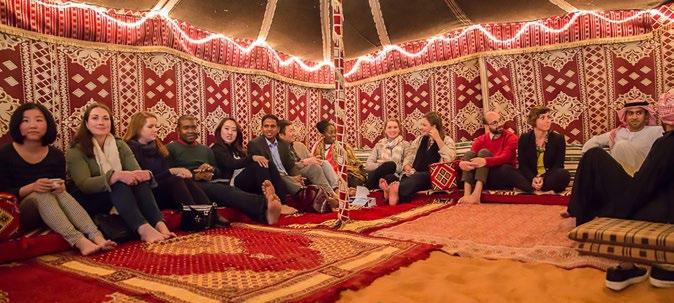
Among the course’s many highlights were high-level briefings with senior officials, such as Rabih Abouchakra, Managing Director of the Office of Strategic Affairs at the Abu Dhabi Crown Prince Court, regarding the opportunities and challenges Abu Dhabi faces around economic development and social welfare. In addition, students visited Expo 2020, the modern-day equivalent of the World’s Fair, where they toured the national exhibits of the UAE, Saudi Arabia, Egypt, Israel, and a pavilion dedicated to the UAE’s efforts in environmental sustainability. Students were granted private audiences with UAE leaders, including Sheikh Sultan bin Ahmed Al Qasimi, a member of the Sharjah Executive Council and His Excellency Zaki Anwar Nusseibeh, Cultural Adviser to the President of the UAE and Chancellor of UAE University.

These engagements enabled students to develop a deeper understanding of the forces shaping the UAE’s efforts to diversify its economy, manage social transformations, and improve the quality of governance. Harvard Kennedy School student Toni Gingerelli said of the experience, “This course helped me gain unique insights on the UAE and Gulf Region that I never would have received from reading the literature alone. The experiential learning was life changing and is a time during my graduate studies I will remember forever.”

belfercenter.org/MEI 15
“ The Arab world is undergoing rapid change, and part of the Middle East Initiative’s mission is to help our students and faculty understand that change and even contribute to it. Sultan Al Qassemi and I therefore designed this course to expose our students to the region’s brightest minds and most influential decision makers, but also to expose the region’s brightest minds and most influential decision makers to our students, whose insightful and searching questions made lasting impressions. Our hope is that future iterations of this course, which will bring our students to more countries and tackle new issue areas, will further strengthen the intellectual exchange between Harvard and the region that is our program’s core focus.”
– Professor Tarek Masoud, Faculty Chair, Middle East Initiative
Faculty Research Grant Awardees

Proposals to Reduce the Dangers
Posed by Iran’s Nuclear Program
Principal Investigator:
Matthew Bunn, James R. Schlesinger Professor of the Practice of Energy, National Security, and Foreign Policy; Co-Principal Investigator, Project on Managing the Atom (MTA), Harvard Kennedy School


This project will make recommendations that reduce the risk of Iran pursuing nuclear weapons capability, including strategies for building an improved, safe, and secure Iranian civilian nuclear program and establishing and maintaining a broad and verifiable gap between this and a nuclear weapons capability.
The Arab Region in a Multipolar World
Principal Investigators:
Timothy Colton, Morris and Anna Feldberg Professor of Government and Russian Studies, Harvard University Meg Rithmire, F. Warren MacFarlan Associate Professor of Business Administration, Harvard Business School
Chaired by Professors Colton and Rithmire, the Weatherhead Research Cluster on Regions in a Multipolar World project at Harvard University has built intellectual bridges between the study of transnational regions, the evolution of the world system, and shared dilemmas of governance. The 2021 Kuwait Program research grant supports the design and execution of a set of surveys in Kuwait and other Gulf and Arab countries critical to generating data about preferences over regional economic and political integration, the defining characteristics of regional identities, and uncovering barriers to cross-border cooperation.
MOSAIC 2021-2022 16
Generously supported by the Kuwait Program and the Emirates Leadership Initiative at Harvard Kennedy School, MEI annually awards grants to Harvard faculty for research related to Middle East policy. This year, MEI funded four proposals by faculty from the Kennedy School, the Business School, and the Faculty of Arts and Sciences.
Market and Credit Constraints to Female Entrepreneurship
Principal Investigator:
Rema Hanna, Jeffrey Cheah Professor of South-East Asia Studies; Faculty Director of Evidence for Policy Design, Harvard Kennedy School

Despite the importance of entrepreneurship for the subsistence of communities around the world, female entrepreneurs still lag behind their male counterparts in terms of firm entry and growth. This gap is even higher in the Middle East and North Africa region. This project will identify market and access constraints to female entrepreneurship, and test context-specific, policy-relevant solutions.
Improving Population Health in the Middle East via Machine Learning and AI-Enabled Mobile

Health Interventions
Principal Investigator: Soroush Saghafian, Associate Professor of Public Policy, Harvard Kennedy School
Middle East countries lag in using mobile health (mHealth) and digital health interventions to improve population health. By leveraging Machine Learning (ML) and Artificial intelligence (AI), understanding scientific and regulatory obstacles, and creating collaborations with scientists and governments in the Middle East, this project will help chart a path for implementing appropriate mHealth interventions in the region.

belfercenter.org/MEI 17

“ We want to help landscape architects, urban planners, and policymakers think more creatively about designing nocturnal landscapes where people feel comfortable and that reduce the increasing demand on energy that living at nighttime creates.”
18
- Gareth Doherty, Principal Investigator, “Design with Darkness: Inhabiting the Kuwaiti Nighttime in the Era of Climate Change”
Image Credits: Deema Alghunaim
Faculty Research Spotlight:

Nocturnal Landscapes and Climate Change –Design with Darkness: Inhabiting the Kuwaiti Nighttime in the Era of Climate Change
Supported by a grant from the Kuwait Program at Harvard University and led by Professor Gareth Doherty, Associate Professor of Landscape Architecture and Director of the Master’s in Landscape Architecture Program at the Harvard Graduate School of Design, “Design with Darkness: Inhabiting the Kuwaiti Nighttime in the Era of Climate Change” explores the relationship between darkness, space, and design.
With a rise in global temperatures resulting from climate change, people in Kuwait and across the Arabian Peninsula are increasingly “living at night” because of the cooler temperatures. Combined with a growing 24-hour economy, public spaces are increasingly illuminated from dusk to dawn, which significantly impacts energy usage.
This project aims to help urban and landscape designers more effectively incorporate darkness into nocturnal landscapes and understand how these landscapes can fit into a broader set of spatial strategies while reducing overall demands on energy usage.
To answer these questions, Professor Doherty and his team—postdoctoral fellow Eman Lasheen, PhD (MIT, 2022) and Bader Al-Dilali, Assistant Professor of Electrical Engineering, Kuwait University—started an atlas of nocturnal public spaces in Kuwait and the Middle East, contributed to an illustrated critical glossary on the urban night for designers, analyzed nocturnal energy use in a selection of Kuwait’s public parks, and developed proposals for improving energy efficiency in those parks, taking them as a microcosm of Kuwait City.
Unable to travel to Kuwait due to COVID-19 restrictions, the team hired Kuwaiti photographer, Deema Al-Ghunaim, to bring the site to Harvard. These photographs, and other virtual tools, were incorporated into Doherty’s Harvard Graduate School of Design course, “Landscape Fieldwork: People, Politics, Practices,” so that students could study the nocturnal landscapes remotely.
Thus far, the research demonstrates that although not all parks are used equally, all are equally lit throughout the night. Given Kuwait’s position as the fourth brightest city in the world at night, the research team proposes a more nuanced approach to the lighting of nocturnal public spaces.
belfercenter.org/MEI 19
Research Fellows
In 2021-2022, the Middle East Initiative hosted a dynamic cohort of Emirates Leadership Initiative pre- and postdoctoral research fellows and a Kuwait Program Research Fellow.

PhD in Political Science, University of Oxford
Dr. Abouzzohour specializes in authoritarian persistence and transition focusing on regimeopposition during upheavals. She is working on a book project on Arab monarchical survival and the causal mechanisms that allow monarchs to contain dissent. Abouzzohour has experience in public policy research and advising NGOs, IGOs, government agencies, and stakeholders. In fall 2022, she will be an Associate Research Scholar at Princeton University’s Institute for the Transregional Study of the Contemporary Middle East, North Africa, and Central Asia.
PhD Candidate in Political Science, Duke University
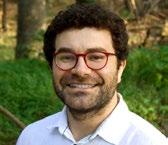
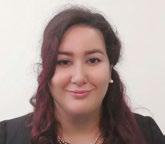
Adiguzel’s research explores the variations in media capture strategies employed by aspiring autocrats – in particular, it digs into the conditions under which a specific strategy, such as censorship, regulatory agencies, or preferential advertising, emerge. He delves into how the two main tools of media and public services are utilized by these leaders to consolidate popular support, and compares the variations in approach across the region. To close gaps in existing literature regarding media independence, Adiguzel collects original data on media capture strategies and their politics. In fall 2022, Adiguzel will be an Assistant Professor of Political Science at Sabanci University in Istanbul.
Assoc. Prof. of Digital Media, Department of Mass Communication and Journalism, Kuwait University
Dr. Al Nashmi’s research focuses on digital journalism, mass communication education, media ethics, and political communication. While at the Middle East Initiative, Al Nashmi researched and wrote about the effectiveness of crisis communication strategies used by the Kuwaiti government during the COVID-19 pandemic. Al Nashmi’s findings indicate that governments that employ thoughtful and proficient communications strategies, with teams proficient in both traditional and new forms of media, are better positioned to effectively respond to crises, mitigate effects, and strengthen relations with the public during times of duress.
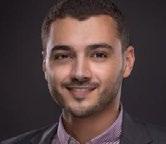
MEI provides support to students studying at HKS from the Middle East and North Africa.
Many of these students come to HKS through the generosity of fellowships that seek to advance the education of young leaders from the region.
Yasmina Abouzzohour Emirates Leadership Initiative Research Fellow
Serkant Adiguzel Emirates Leadership Initiative Research Fellow
Dr. Eisa Al Nashmi Kuwait Program Research Fellow
20
PhD in Political Science, Northwestern University
Dr. Al-Saeedi studies the effects of changes in media technologies on politics in non-democratic contexts. With a focus on Saudi Arabia, her research finds that the cassette tape advantaged conservatives in the 1980-2000 period, enabling them to shape public debates and policy regarding salient issues. In the 2000-2021 period, however, the Internet facilitated marginalized ideological elites’ ability to influence public discussions and redirect pressure on the state, disadvantaging conservatives’ policy agenda of the earlier period. Al-Saeedi provides a multifaceted study of an autocratic system that is often understood only superficially. Al-Saeedi believes that her research can apply to other countries—such as Russia and China—where concerns about political participation, free expression, and authoritarianism persist. Al-Saeedi successfully defended her dissertation in spring 2022. She will be a postdoctoral fellow at MIT in fall 2022.
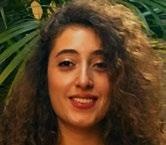
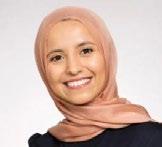
PhD in Political Science, Columbia University

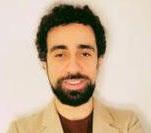
Dr. Mohamed researches the role of religion in political and economic development, particularly how religious norms shape economic policymaking in the Middle East and the Muslim world, and how they can be used to improve governance. His research suggests that the charitable nature of Ramadan increases public scrutiny on the economic performance of governments, which motivates incumbents to be more responsive to the needs of their citizens. This research demonstrates how Islam can serve as a political force to empower MENA citizens and improve governance. Mohamed successfully defended his dissertation in spring 2022. He will join the Center for Democracy, Development, and the Rule of Law at Stanford University as a postdoctoral fellow in fall 2022.
PhD in City & Regional Planning, University of California, Berkeley
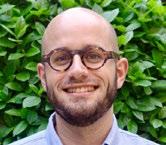
Dr. Salman’s research focuses on two aspects of local-level democratic transformation in Tunisia: the settlement politics of popular neighborhoods on the urban periphery and how increases in gender equality at the municipal level affect urban spatial segregation. Her work offers an understanding of urban politics beyond its procedural and institutional dimensions, focusing on the everyday politicization of the urban poor through building their homes and cities. Her research advocates for better service delivery for the urban poor and systems of local governance where municipalities are granted financial, administrative, and political independence to service their citizens. By combining archival research with participant observation and interviews, Salman aims to determine whether, and under what conditions, elected female representatives can build more equitable cities.
PhD in Political Science, University of Wisconsin –Madison
Dr. Weiss’ research centers on the political consequences of, and institutional remedies for, intergroup conflict in Israel. Guided by theories across the social sciences, he uses field experiments, surveys, and administrative and social media data to better understand what types of policies can reduce conflict and animosity between groups, and how conflict itself shapes political preferences and voting behavior. He has been working with hospitals and schools in Israel to design, implement, and test interventions to improve intergroup relations and promote tolerance between Jews and Palestinians. Weiss successfully defended his dissertation in summer 2022. He will be a postdoctoral fellow at the Conflict and Polarization Lab at Stanford University in fall 2022.
belfercenter.org/MEI 21
Safa Al-Saeedi Emirates Leadership Initiative Research Fellow
Ahmed Ezzeldin Mohamed Emirates Leadership Initiative Research Fellow
Lana Salman Emirates Leadership Initiative Research Fellow
Chagai Weiss Emirates Leadership Initiative Research Fellow
Policy Research
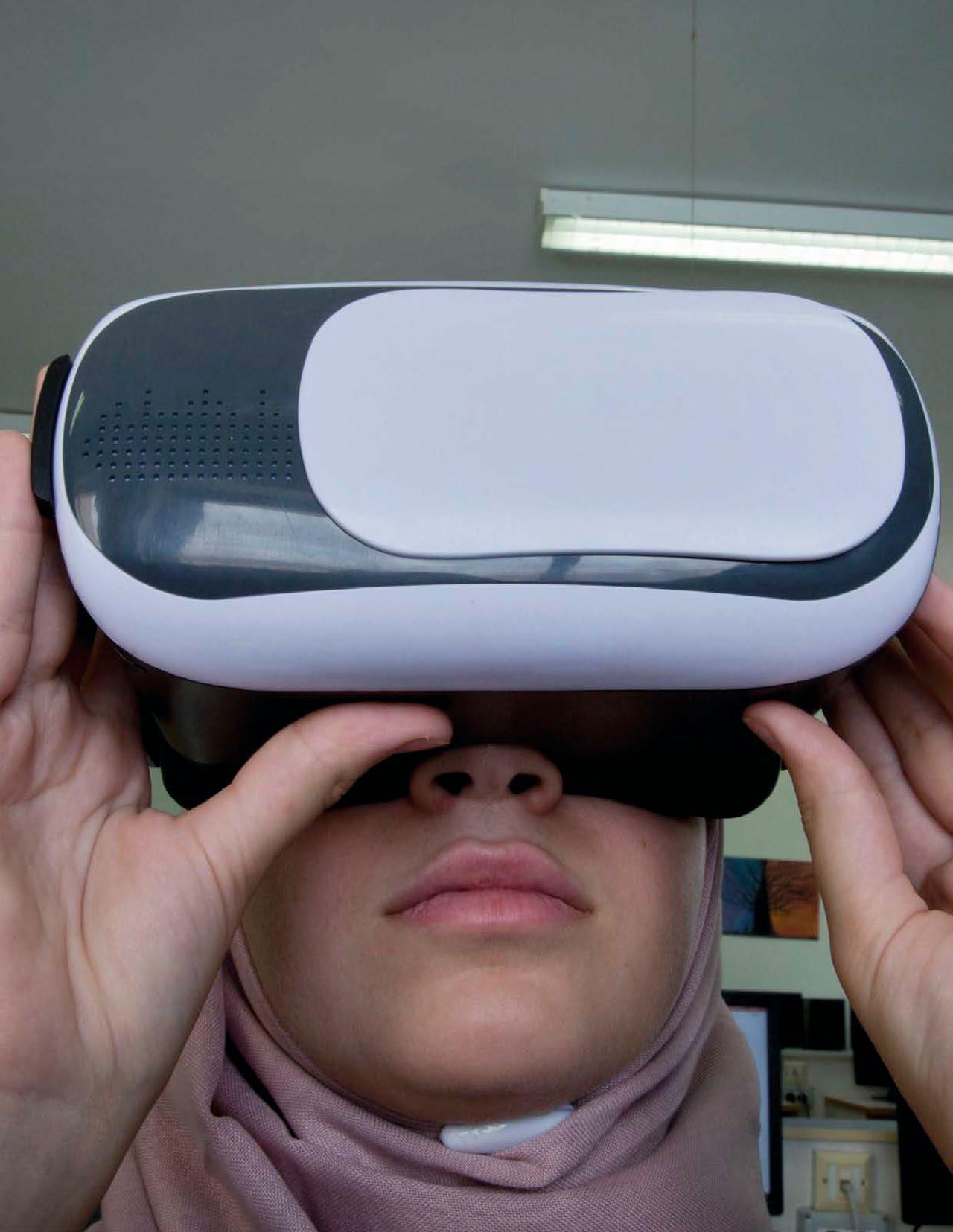
22
MEI Fellow Spearheads New Approach to Accelerate the High-Tech Economy in Palestine
MEI Fellow Avner Halperin and his research partners, Palestinian entrepreneur Mahmoud Khweis and Ely Sandler (MPP 2023), conducted a major research project that outlines a blueprint for rebooting the Palestinian tech ecosystem. To do this, they propose creating a champion for Palestinian technology in the form of a new entity called the Global Palestinian Innovation Foundation (GPI), which they detail in their May 2022 report “Time to Reboot: A Blueprint for the Palestinian Tech Sector.” GPI will be independent and, they hope, have global backing which will help drive change in the West Bank and kickstart the Palestinian tech sector.
Halperin and his co-authors—who are Israeli and Palestinian— have no illusion that GPI will be a panacea for the Israel-Palestine conflict; however, they hope that in creating economic growth and increased collaboration in the region, it will contribute to building a foundation of lasting trust between their peoples.
In an interview with Harvard Kennedy School’s Office of Communications and Public Affairs (OCPA), Halperin discussed the new approaches to accelerate the high-tech economy in Palestine and connect the Palestinian economy with the international tech sector as outlined in the report. This interview was conducted by OCPA’s Susan Hughes and published on HKS’s website on August 30, 2022. It has been edited for length.
belfercenter.org/MEI 23
Researchers develop a new approach to accelerate the high-tech economy in Palestine
A proposed innovation foundation creates an opportunity to connect the Palestinian economy with the international tech sector.
Q: How did the idea for the GPI Foundation come about?
I have been involved in high tech in the Middle East for 30 years focusing on inclusion in high tech and how we get different populations more involved. My company, based in Israel, had a Palestinian R&D team developing health software apps for the U.S. market. When I left that company and had an opportunity to connect with the Middle East Initiative at HKS and Professor Tarek Masoud, I wanted to continue to work on policies that promote inclusiveness in high tech in the Middle East. There was a lot of policy work already being done on the Israeli side. So, we wanted to look at how we could promote the Palestinian tech sector, especially in the West Bank.
Q: Your report notes the lack of tech development in the Palestinian territories is not because of a lack of effort or financial support, but rather due to a failure to establish mutually beneficial partnerships and prepare participants for the international business scene. How does your plan remedy this?
We propose a new policy initiative that focuses on building international business links and partnerships. We were inspired by an existing and highly successful U.S. initiative, the Binational Industrial Research and Development Foundation (BIRD), that promotes the Israeli high-tech sector. For GPI, the idea is to invest where we can tangibly build bridges between Palestinian businesses and American entities and Gulf entities.
If you want to build a tech ecosystem, especially a peripheral one, whether it’s in Israel, Taiwan, Singapore, or Ireland, you need a champion. This effort has lacked a champion. With the governance challenges in the West Bank, you need an independent entity that will push for Palestinian tech growth, collaborate closely with multi-national corporations that will want to operate locally, and promote academic collaborations. We hope GPI will fill this void and be that champion.
MOSAIC 2021-2022 24
MEI Fellow Avner Halperin and “Reboot” report coauthors, Mahmoud Khweis, a tech entrepreneur focusing on the Palestinian economy, and Ely Sandler, an Israel Policy Fellow pursuing a master’s in public policy degree at HKS, propose the creation of a new foundation—Global Palestinian Innovation Foundation (GPI)—to boost the Palestinian tech sector. We asked Halperin about the research, the foundation, and how GPI can succeed where other efforts have failed.
“As a citizen of the Middle East, I believe that anything we can do to promote the economy and wellbeing of the Palestinian people will contribute to building bridges, generating collaboration and, hopefully, leading to a peaceful resolution in the future.”
– Avner Halperin, MEI Fellow
Q: What factors indicate success for GPI?
I’ll highlight three: One is connecting the Palestinian diaspora with our efforts in the region. This link has not been sufficiently tapped into before. Many successful U.S. high-tech firms—e.g., Apple, Intel, and Microsoft—have Palestinians in senior leadership positions. When you look at other countries’ high-tech ecosystems, you’ll see that the success of their children is a very important success factor. An important function of GPI will be to connect members of the Palestinian diaspora in high-tech firms overseas with our efforts in the region and enlist their support of our efforts. A second factor is increasing and promoting women’s participation in the high-tech ecosystem and in building the Palestinian economy. A third key factor is identifying and securing the support of international entities, such as the U.S. State Department and Gulf countries. We see a unique opportunity for the Palestinian tech ecosystem to be a gateway between Israel and the Arabic-speaking world. Much of the global tech sector has not successfully made headway into the Arabic-speaking world. The Palestinians are well positioned to be that portal.


We envision GPI becoming a model for similar future entities in the West Bank to promote areas of health, education, and energy. It may become part of a longer-term effort by the United States and other supporting governments to strengthen Palestinian civil society and build state capacity.



Q: What role did HKS play in the development of this proposal?

Our team was privileged to receive tremendous support and guidance from Professor Masoud and the entire Middle East Initiative research team, as well as from HKS faculty such as Professor Richard Zeckhauser and from Harvard Business School.
For GPI to succeed, it needs to focus on economic development independently of local governments. Also, it’s important to note that GPI is intended to be led by Palestinians, for Palestinians, and by Palestinians, we hope, with support from the U.S. and Gulf countries. HKS can provide invaluable policy evaluation and the convening power to continue to discuss and develop GPI’s mission. As a citizen of the Middle East, I believe that anything we can do to promote the economy and wellbeing of the Palestinian people will contribute to building bridges, generating collaboration, and, hopefully, leading to a peaceful resolution in the future.
Q: What comes next?
We are talking to key decision-makers at the State Department and the U.S. Embassy in Israel in hopes they will support our efforts. We will create a working group that will help advise us as we move toward implementation. We will continue to talk to other key stakeholders such as the World Bank, Gulf states, and the UN to try to garner support.
There is much work to be done to create linkages between the Palestinian and the wider Gulf high-tech ecosystem, which is what I will focus on in the coming year. We hope that MEI will continue to help us with ongoing policy analysis and research, as well as be a convening hub for generating ideas and discussion to help make GPI a success.
belfercenter.org/MEI 25
Student Research & Internship Funding
Through the Emirates Leadership Initiative, MEI supports research and internship opportunities related to Middle East and North Africa policy for Harvard students. This year, MEI awarded funding to four HKS students for winter Policy Analysis Exercise (PAE) research projects and to two HKS students for summer internships and hosted a Harvard student for an in-house research internship through the Belfer Summer Research Assistant Program.
“ This summer, I worked with the non-profit, Village Capital, to understand how impact-driven fintech startups can support the financial inclusion and resiliency of migrants and refugees in the Middle East. Thanks to the financial support of the Middle East Initiative, I discovered the world of social entrepreneurship and confirmed my conviction that entrepreneurs can—and increasingly must—play a crucial role in addressing some of our most complex contemporary policy challenges.”
Summer Internship Funding Recipient

Justine Bailliart, MPP 2023
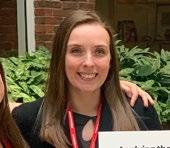

“ The research grant from the Middle East Initiative enabled me to travel to Qatar to conduct field research about the 2022 World Cup. This primary research was key to developing more realistic and concrete recommendations for my client on how to host the first and largest global gathering in a postpandemic world.”
PAE Research Award Recipient
Majd Steitieh, MPP 2022 Rawabi Fellow
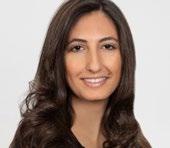
“ We interviewed numerous humanitarian practitioners about the use and efficacy of neutrality in humanitarian interventions in Syria and Somalia. Our final report for our client, the World Health Organization, was very well received and, we hope, will be useful to other practitioners and organizations in the humanitarian sector. We are grateful to the Middle East Initiative for supporting our project.”
PAE Research Award Recipients
Keri DiBattista, MPP 2022 Dana Radojevic, MPP 2022
Lauren Truong, MPP 2022

MOSAIC 2021-2022 26
“
The funding that I received from MEI enabled me to do my summer internship at the U.S. State Department’s Office of Analysis for Near Eastern Affairs. That experience was among the most rewarding, energizing professional experiences of my life. The opportunity to provide timely analysis to policymakers—and to be recognized for my work—has truly been a highlight of my Kennedy School experience.”
Summer Internship
Funding Recipient Nick Vargish, MPP 2023
Student Highlights
“My internship with Professor Masoud was a great opportunity and learning experience. Working with statistical computer software, I sharpened my quantitative skills and learned so much by examining the relationship between Islamist parties, political institutions, and democracy worldwide.”

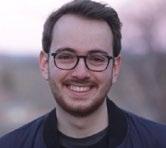
Belfer Center Summer Program Intern Tianyu Qiao, AM 2023
My name is Howaida Mahmoud Barakat. I’m from Egypt. Being a Harvard graduate was a dream that I kept in my heart for more than 20 years. I never thought I was good enough to get admitted to such a world class university. In December 2020, after much thought, I decided to apply to the Mid-Career Master’s in Public Administration Program. My decision was fortified by my desire to find answers to the many questions that working in the public sector poses. For me it was, the bigger the challenges, the more the insistence to become an agent of change in my country. Spending a year with some of the most impressive, world-leading professors that I could ever come across certainly helped me shift my thinking. Being a colleague to people who have chosen to dedicate their lives to causes such as environment, alleviating poverty and combating inequality inspired me and revived the hope inside me for a better future. I’m grateful for the opportunities Harvard Kennedy School has given me. After graduation and returning to my home country, I decided to share the knowledge I acquired and teach others what I have learned. Education is freedom and is the most powerful tool to make positive change. When you teach youth, you give them the tools to shape their future the way they aspire. I joined academia and made instruction my profession—not just a hobby as it used to be before.
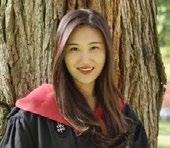 – Howaida Mahmoud Barakat, MC/MPA 2022 and ELI Student Fellow
– Howaida Mahmoud Barakat, MC/MPA 2022 and ELI Student Fellow
belfercenter.org/MEI 27
The Middle East Initiative at Harvard Kennedy School is dedicated to advancing public policy in the Middle East by convening the world’s foremost academic and policy experts, developing the next generation of leaders, and promoting community engagement on campus and in the region.

2021-2022 79 John F. Kennedy Street Cambridge, MA 02138 617.495.4087 belfercenter.org/MEI









































































 – Howaida Mahmoud Barakat, MC/MPA 2022 and ELI Student Fellow
– Howaida Mahmoud Barakat, MC/MPA 2022 and ELI Student Fellow

